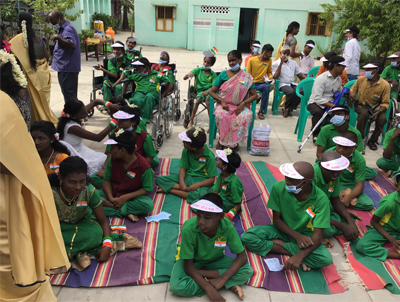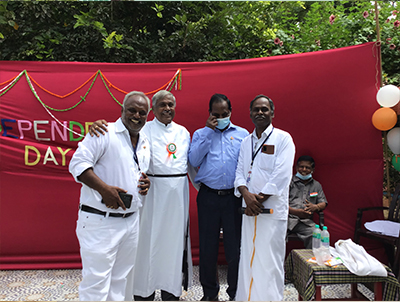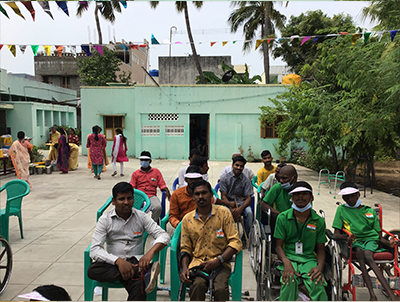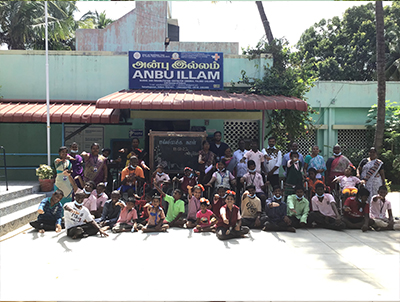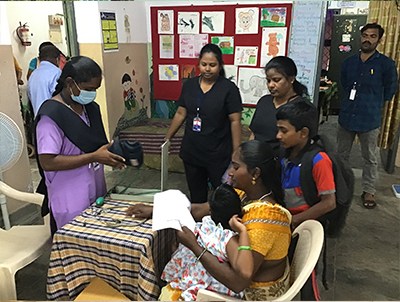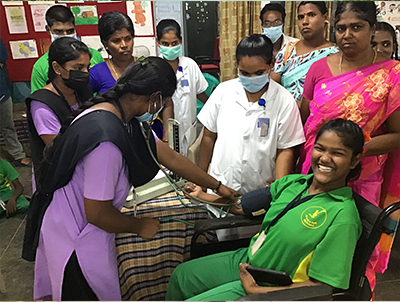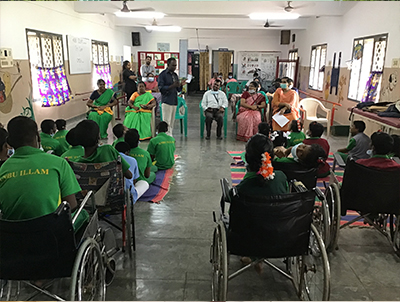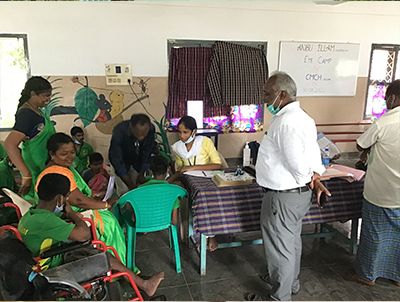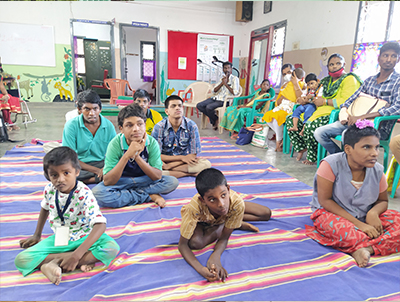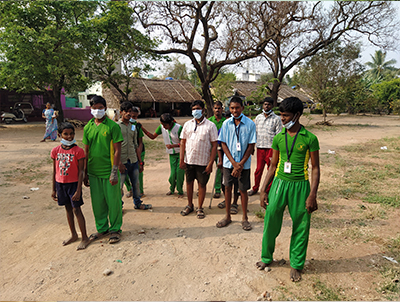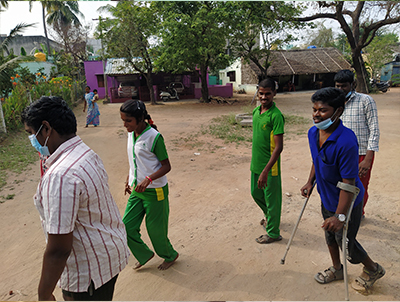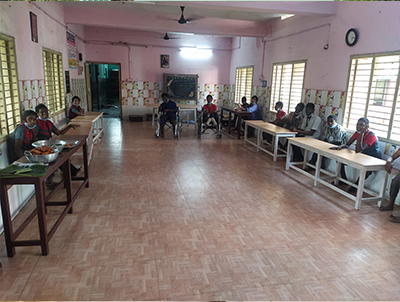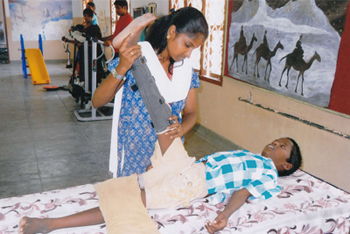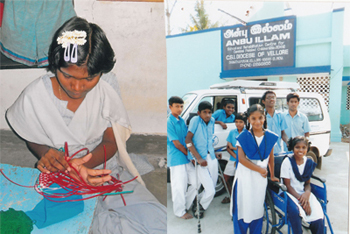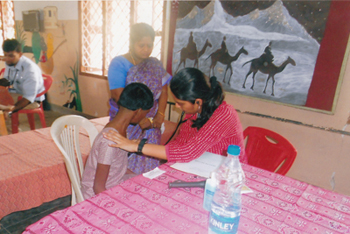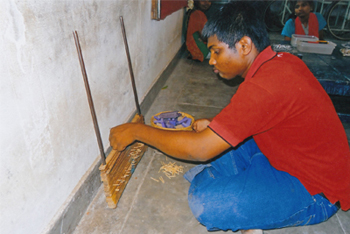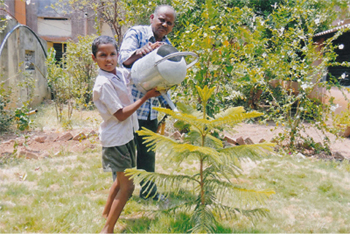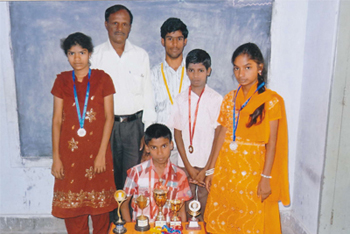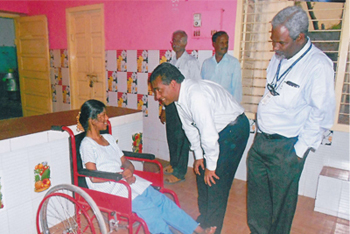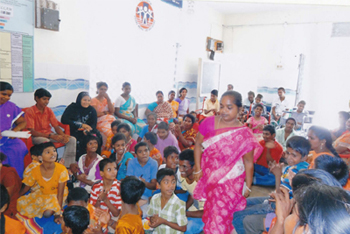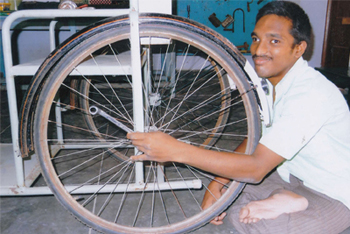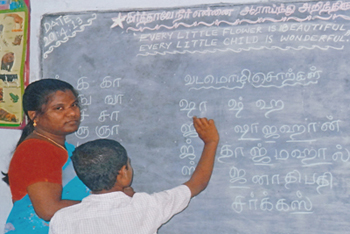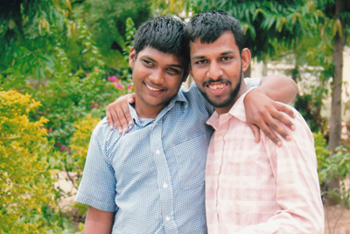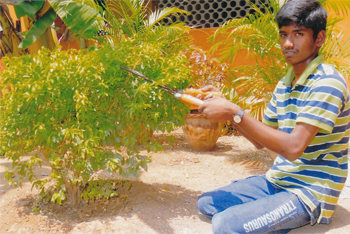OUR PROGRAMMES
The infra-structure and staffing
It was started with the minimum facilities including the staff structure. Currently, it has dormitories, colourful class rooms with all the aids required for special education, a well-equipped therapy room, a vocational training section and a kitchen. It is staffed by a dedicated team of trained special educators, physiotherapists, occupational therapists, social worker, vocational instructor, helpers, warden and project officer. In addition, medical monitoring is provided by a team of specialists from the Christian Medical College, Vellore. The services of a speech therapist is provided on a part-time basis. The facility is available for a maximum of 100 children of any caste or religion from various parts of Tamil Nadu and neighbouring states particularly from poor socio-economic background.
Special Education
The training and special education programme ranges from the newly admitted five year olds to 18 years of age. After primary schooling, eligible children are send to the nearby regular schools run by the Government or the schools run by the Diocese of Vellore. This integration is helpful for those who will continue into other courses and professional work. Those who are with the comorbidity of intellectual disability are trained by trained and experienced special educators within the premises. As children reach their maximum level, they are provided with vocational skills comprising practical work experience suited to their own abilities. After the age of 18, they are helped to start simple jobs on their own within their limited resources. The teachers use special education methods to identify and help the children overcome their particular learning difficulties. Classroom walls and shelves are filled with visual aids which are used to make learning active and enjoyable.
Treatment
Participation is also the essential component in therapy. Physiotherapy and occupational therapy are combined and is carried out by therapists and their assistants. Each child has their own treatment plan. They learn to overcome spasm and control their movements. Some exercises take place before school starts, in groups according to their mobility, and most children also have an individual time with their therapists each day. Creative activities are organised for the younger children, using colour, sticking paper and dough. Construction toys from a large part of the coordination training needed by many children and this also improves their perceptual abilities. Games are devised for the enjoyment of learning by doing, some being adapted as treatment techniques.In order to mobilize them more, variety of therapy activities are designed by qualified physiotherapists and occupational therapists. More attention is given for fine motor and gross motor activities to lead them towards independency in self-care as well as vocational skills to promote their financial viability.
Speech therapy is an urgent need for many of the children. Short term volunteers have given guidance and other staff are attempting to carry this out.Most of the children need training in how to care for themselves-bathing, toileting, eating and dressing. Therapists teach this and guide the staff assigned to help each child. This takes patience and care. Behavioural techniques are used to motivate children who prefer not to try. Older children soon learn to help the younger or more disabled ones.Medical and Surgical services are provided regularly by a paediatrician and a physical medicine specialist from Christian Medical College (CMC), Vellore.
Early treatment Plan
The need for early treatment has been a concern and yet unresolved. Children under five years are too young to leave their parents, and these early years are vitally important for creating more normal habits and preventing fixed deformities and unhelpful behaviour patterns. A plan is now developing in which infants would come to Anbu Illam with their mothers for two months periods. The mother will be given a practical training in how to handle and treat her child, while gaining awareness of the child’s progress. She would also have the support of other mothers experiencing similar feelings and pressures.
Parents
All parents of children at Anbu Illam are encouraged to visit and discuss their children’s progress and problems with the staff. Every three months a ‘Parents Day’ is held, on which they see something of the relevant teaching and treatment taking place. They are advised on how to maintain their child’s abilities during holidays. Visits to their homes are made by the staff during holidays too, in order to see how the child is fitting into his home or community. The social worker visits even before a child is admitted, to assess the family situation. Communication is then maintained as far as possible with the family, so that plans for the future are made by them at the appropriate time.
Vocational training and rehabilitation
Activities are organised by the occupational therapists with the help of skilled instructors. Basic carpentry, cycle repairing, chalk making, screen printing, candle making, jewellery, stitching and gardening are some of the skills taught. Following this experience and gradual assessment of their abilities, plans are made for those ready to go home or on to further training. Those whose educational achievements are less high may stay longer at Anbu Illam for work skill training and may perhaps return home to start a small business or some other skill with the support of their family. Work related skills are imparted to those who are with less physical problems and adequate cognitive ability. After completion of training, they are resettled into his or her own community. Some of our students have been able to complete training in electronics, sewing and embroidery. Others have received training in computer, co-operative training and still others have settled in self-employment projects.
The Children are a source of joy and stimulation to the staff. Having realised that they are accepted and loved for themselves in spite of their limitations, they respond with love and concern for each other and for those who teach, treat and care for them. At home they have little contact with any but their immediate family, as knowledge of how to encourage and involve these children is sadly lacking in the communities from which they come. |
